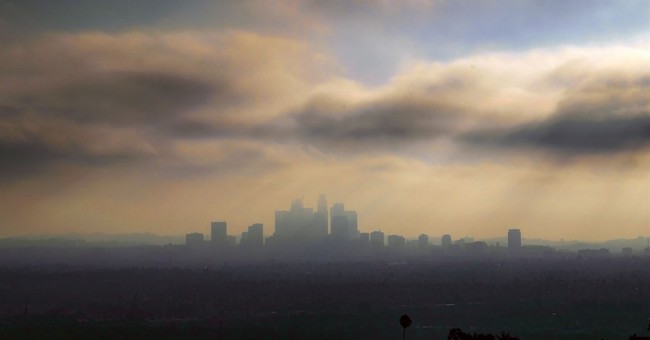
FILE – In this Oct. 26, 2018, file photo, downtown Los Angeles is shrouded in early morning coastal fog and smog. California officials on Friday, Oct. 26, 2018, blasted the Trump administration’s plan to freeze vehicle emissions standards, saying it threatens public health and the environment and was based on a flawed scientific analysis. The California Air Resources Board, whose unique authority to set its own vehicle emissions standards would be rolled back under the administration’s proposal, submitted more than 400 pages of analysis rejecting the plan and the research behind it. (AP Photo/Richard Vogel, File)
Talk to almost anyone who lives in a metro area right now and they will express some common sentiments: they are worried for their health and safety; they are worried if the character of their city will be forever changed by the crisis and they are worried if their local leaders have what it takes to help the city recover.
The concerns of the people are real – the stark reality is that budgets are tighter because of COVID-19. There is a long road to recovery. Now, more than ever, we need to ask ourselves how we can 1) maintain good public health and sanitation, and 2) how governments can recover without breaking the bank.
Believe it or not, in the middle of this airborne crisis – some cities and states are spending millions of tax dollars to continue to subsidize the burning of trash. In many cities, this isn’t a headline-grabbing issue. But it should be right now as COVID exposes the dangers of burning trash by attaching itself to particulates in the air.
Yes, believe it or not cities and states around the U.S. pay for incinerators to burn their trash. It’s rebranded and sold as “renewable energy,” but let’s be honest about what it is: trash–yes, your trash–set on fire in huge quantities.
This is all a part of the left’s latest obsession of “zero waste goals.” And as you would expect, to avoid these items hitting landfills, governments are putting trash up in smoke, which is more much more harmful that a contained and closely monitored waste side or recycling program.
To put it more simply, some Americans might be breathing in last week’s discarded plastic takeout container while paying for the pleasure of it. And you shouldn’t be.
In some cities, like Baltimore, taxpayer-funded trash incineration is the number one cause of pollution in the air and one local incinerator is in constant litigation and complaints from neighbors.
And in Baltimore and other cities, the unfortunate reality is that the incinerators themselves are placed next to low-income neighborhoods made up of mostly minorities.
In the name of “zero-waste goals,” taxpayers are subsidizing this pollution with renewable energy tax credits and even direct payments to incinerator owners.
Detroit’s incinerator ultimately cost local taxpayers nearly $1 billion over the course of 30 years. Unfortunately, taxpayers are paying for their own demise. This is crony capitalism.
There are better alternatives out there to just burning garbage in our cities—there are successful businesses who have figured out how to deal with trash without lighting it (and our tax dollars) on fire.
There are innovators who have figured out how to take our trash and reuse it efficiently, using the latest in science and engineering to convert trash into materials that other companies will pay for. Those efforts should be the ones that cities should be looking for, not wasteful “waste to energy.”
We need to encourage efficient waste disposal methods. Cities need to realize that fancy buzz-words like “thermal treatment facilities,” or “renewable energy,” or “waste-to-energy” can’t cover up the stink of what we are really talking about—burning garbage in our streets.
There’s no time more well-suited to look for smart, cost-efficient, and healthier methods of dealing with our waste as our city recovers from COVID-19. For the sake of our city budget, for our vulnerable communities, and for commonsense sake, we need to stop lighting our trash on fire.
I want our communities to remain a safe, healthy, vibrant place to live, and burning municipal trash does not meet that goal. As a budget hawk who supports business growth and innovation, the crony capitalism of giving taxpayer money to failing businesses and theories just doesn’t cut it. The time has come for local and state governments to end burning the practice of burning trash for good.













Join the conversation as a VIP Member